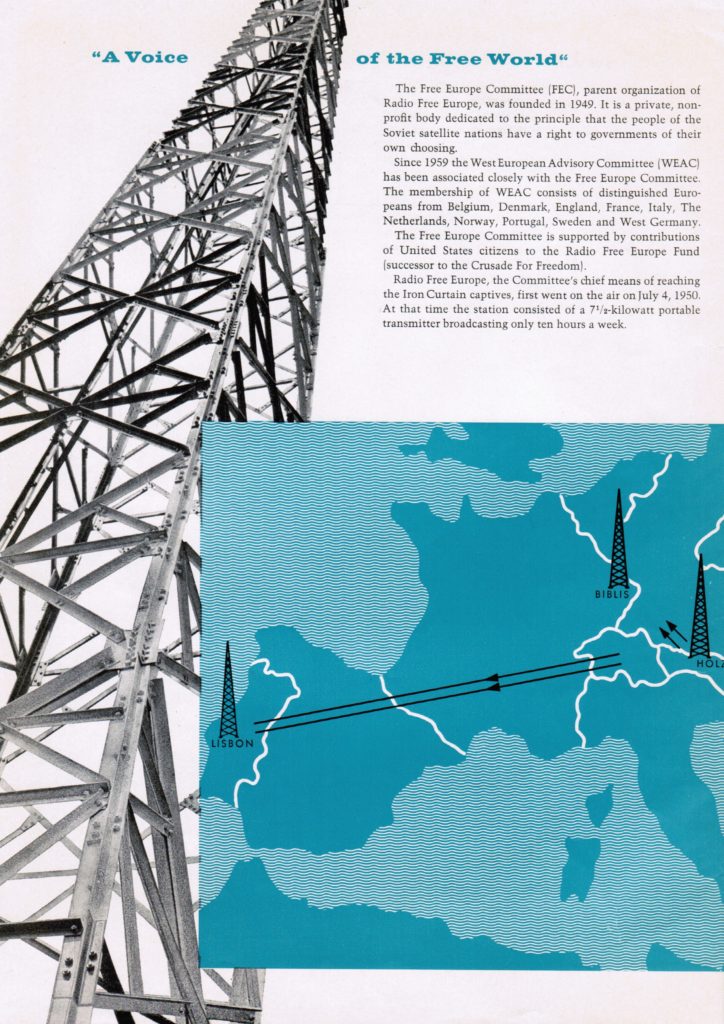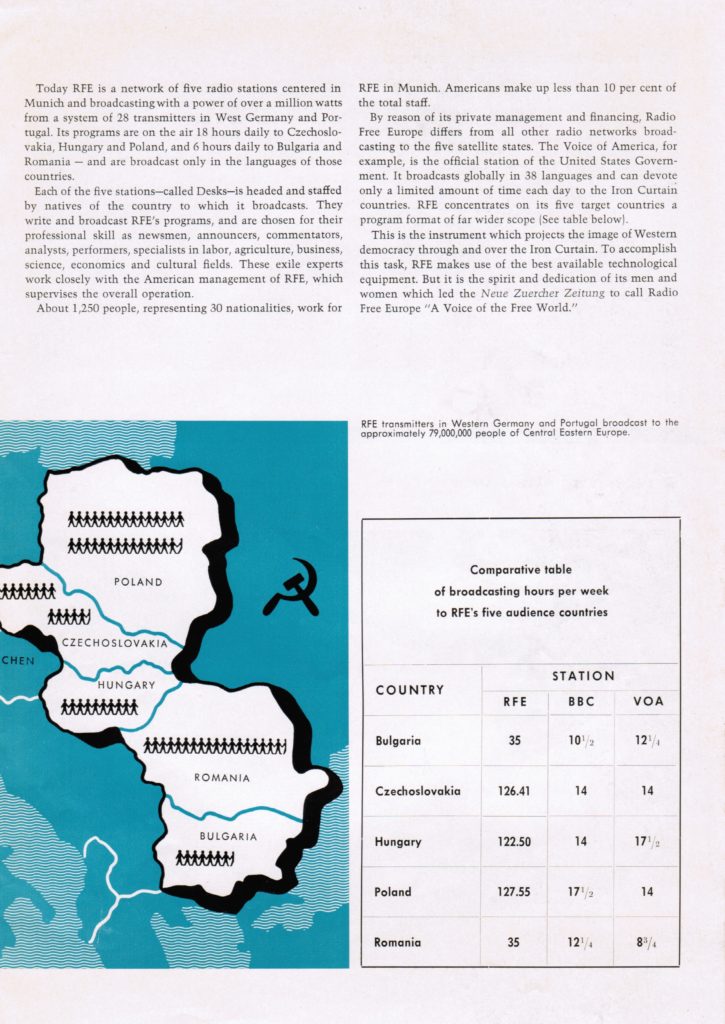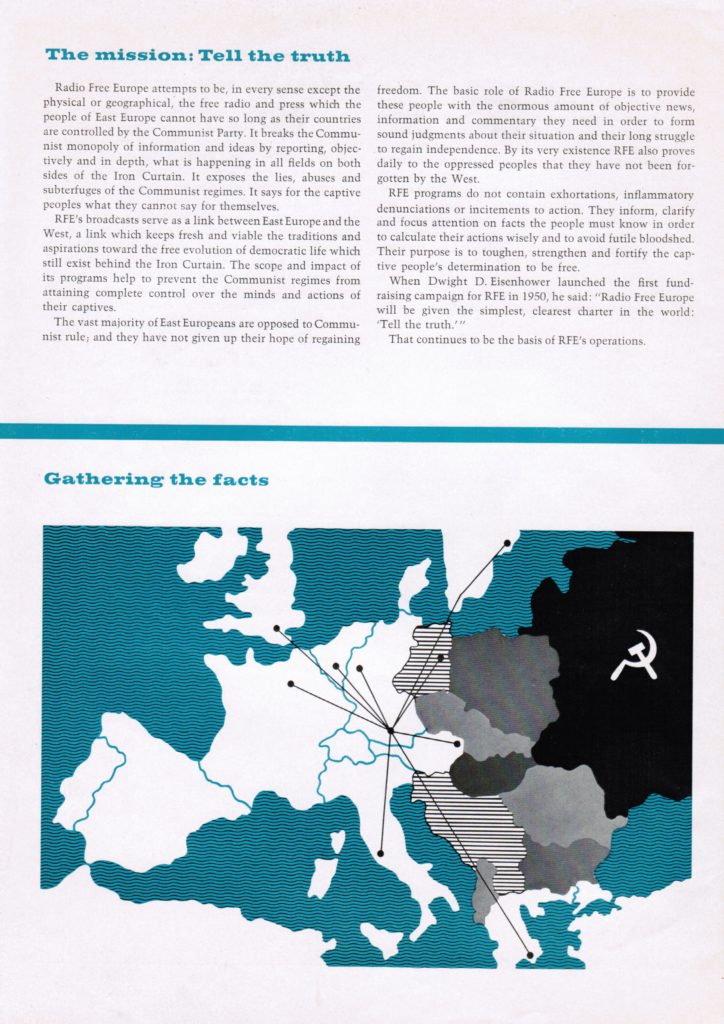Radio Free Europe Launched in 1950
Radio Free Europe started broadcasting on July 4, 1950. The first broadcast was to Czechoslovakia. It originated from New York with the following words: “The voice of free Czechoslovakia is speaking, the radio station Free Europe.” Later, RFE established its headquarters in Munich, West Germany. These images from a publicity pamphlet contain descriptions of RFE’s mission and programs circa 1960. While supported by private donations from Americans, RFE received nearly all of its funding from the U.S. government in congressional appropriations hidden in the CIA budget. The CIA also managed the broadcasting organization, but refugee journalists enjoyed a high degree of independence, which was much greater than what Voice of America (VOA) broadcasters were allowed to do in reporting on human rights violations behind the Iron Curtain until the Reagan administration carried out management and programming changes at VOA, starting in 1981. In the early 1970s, the CIA link to RFE and Radio Liberty (RL), which broadcast from Munich to the Soviet Union, was removed.




By Ted Lipien
Happy Birthday, Radio Free Europe!
I had lived in communist-ruled Poland until the age of 16, listening to RFE Polish Service. Its broadcasts opened my mind, although as far as knowledge of history and understanding of Marxism, Communism, state-run media, schools, and socialist economies, I had already learned basic facts from my family, neighbors, Catholic priests and nuns, and a few courageous teachers. I was also old enough to make my own observations of life in a country ruled by a Soviet-imposed, illegal, and inhuman regime. What Radio Free Europe gave me was hope that I might be able to escape such a life and live in freedom, which I did in 1970. I did not know then and did not expect that the Soviet communist empire would collapse within my lifetime.
When I was a teenager in Poland, I dreamed of working for Radio Free Europe, but because I emigrated to the United States to join my father in 1973, I started working for the Voice of America in Washington, DC as a 20-year-old college student. In the 1980s, I had the honor of leading the VOA Polish Service during the Solidarity trade union’s struggle for human rights and Poland’s independence. I interviewed future Pope John Paul II and Solidarity leader and future Polish President Lech Wałęsa. In 1989 I covered for VOA the fall of communism in Poland. I retired in 2006 from my last VOA job as acting associate director in charge of central programs.
Thank you, Americans, for supporting Radio Free Europe, Radio Liberty, and the Voice of America during the Cold War!
I want to say: Thank You, RFE!
I also want to say: Thank You, VOA!
It was not always easy, but I had a rewarding and meaningful career in Cold War journalism.
Until Ronald Reagan’s presidency, we at the Voice of America did not have the same freedom as RFE journalists had. We envied their superior programming to Poland. But even with various policy restrictions, the Voice of America also contributed to restoring democracy in East-Central Europe from the early 1950s through the end of the 1980s.
Yet I’m convinced that the Voice of America could not have done it alone if there were no Radio Free Europe. The end of Communism in Europe would not have come as fast as it did. RFE’s administrative setup and personnel were far superior to VOA’s.
VOA had a much more problematic history than RFE, and unlike RFE, its leadership has never acknowledged some of its biggest mistakes and failures. There were Communist and Soviet sympathizers among Voice of America’s early officials and journalists, people like Howard Fast, the 1953 recipient of the Stalin Peace Prize; RFE never hired Communists unless they had already left the Communist Party and condemned Communism. There were times between 1942 and 1981 when VOA repeated Soviet propaganda, censored Alexandr Solzhenitsyn, and downplayed reports about the Gulag; RFE never did.

Ted Lipien is a journalist, writer, and media freedom advocate. He was Voice of America’s Polish service chief during Poland’s struggle for democracy and VOA’s acting associate director. He also served briefly in 2020-2021 as RFE/RL president. His book “Wojtyła’s Women” was published in 2008 by O-Books, UK. He is now an independent journalist and a media freedom advocate.

